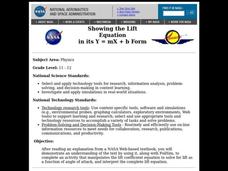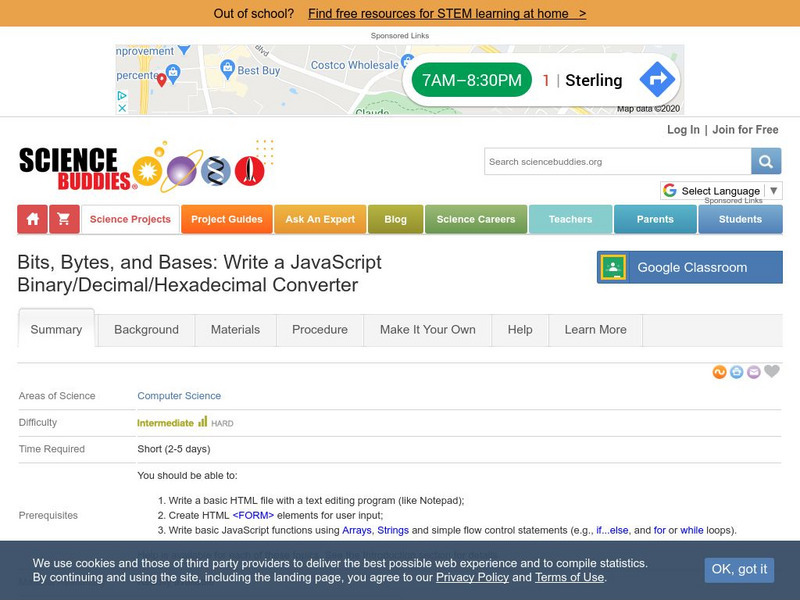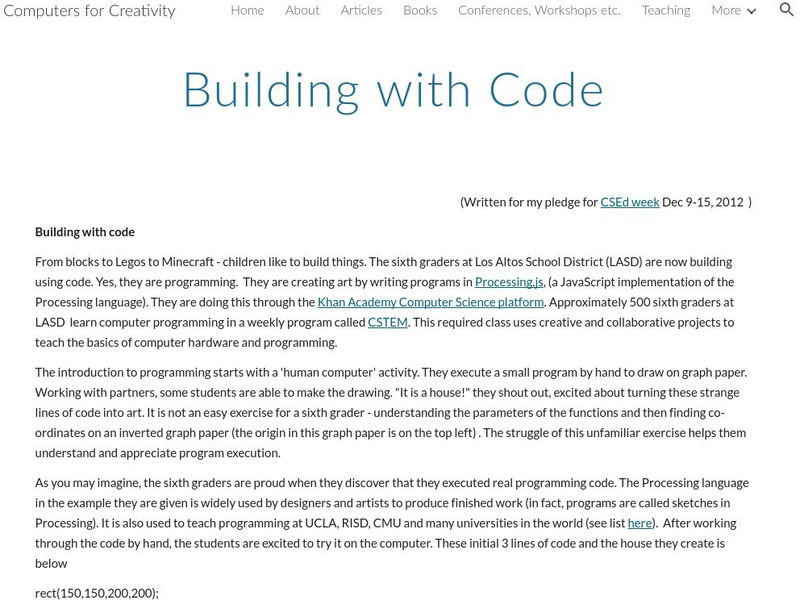Curated OER
Upside-Down Wings
Learners use FoilSim to demonstrate that the graphic analysis of the airflow around one object can be used to hypothesize airflow graphs for objects as they are elongated from a sphere to an airfoil shape.
Curated OER
Design of Airfoil for Given Lift
Students use FoilSim to design an airplane wing that generates a given lift. As they change parameters such as airspeed, altitude, angle of attack, thickness and curvature of the airfoil, and size of the wing area, the software...
Curated OER
Actual Airflow vs. Ideal Airflow: Stalls
High schoolers use 3-D modeling techniques to observe the characteristic signature of the stall condition apparent on an airfoil at high angles of attack. They use FoilSim to compare the above with ideal airflow.
Curated OER
Design of Airfoils and Problem- Solving Using FoilSim
Ninth graders, after reading the explanation given below, complete the problem-solving activities to demonstrate an understanding of the concepts presented.
Curated OER
Did You Catch My Drift?
Students, through the use of the Curveball interactive software package, become familiar with the way in which the flow of air across or around an object affects its ability to lift, spin, and curve. After reading the explanation given...
Curated OER
Wing Specifications
Ninth graders use FoilSim to fulfill the specifications of a given airfoil (wing) and plot and interpret graphs.
Curated OER
Froggy Fun
Students exploring about frogs and their environment. They describe what camouflage is and why it is useful to frogs especially in the environment that frogs live in. They also draw a picture of a frog in its habitat.
Curated OER
The Baseball and Air
Students use Curveball to complete the activity to determine how the speed of airstreams changes in relation to changes in the distance of the airstream from the center of the baseball.
Curated OER
Showing the Lift Equation
Students read an explanation from a NASA Web-based textbook, then demonstrate an understanding of the text by using it, along with FoilSim, to complete an activity that manipulates the lift coefficient equation.
Curated OER
Pharaoh Phonetics
Students explore ancient Egypt. In this Egypt lesson, students use the Internet to research ancient Egypt and then participate in several activities that help them better understand Egyptian culture.
Curated OER
Wind Gauges
Students use FoilSim interactive software to become familiar with the way in which the flow of air across or around an airfoil affects its ability to create lift.
Curated OER
Wing Area Effects Problem Set
Students read an explanation from a NASA Web-based textbook on lift and an explanation on the FoilSim software package given below. They use FoilSim to evaluate the relationship between wing area and lift.
Curated OER
Velocity Effects Problem Set
High schoolers, after reading an explanation on lift from a NASA Web-based textbook and an explanation on the FoilSim software package given below, use FoilSim to evaluate the relationship between velocity and lift.
Curated OER
Temperature and Altitude
Students, after reading the explanation given below, use FoilSim to gather and record data on temperature and altitude generated by the FoilSim control panel.
Curated OER
Characteristics of Lift and Wing Area
Students use FoilSim to complete the activity and investigate the factors that affect lift and how wing area and lift are related.
Curated OER
Lift Equation Problem Set
Students, after reading an explanation from a NASA Web-based textbook, demonstrate an understanding of the text by using it, along with FoilSim, to complete an activity to graph and interpret the lift equation.
Duke University
Duke University: Advanced Placement Computer Science Java Subset Specification
Provides information about the APCS Java Subset in javadocs form.
Science Buddies
Science Buddies: Write a Java Script Binary/decimal/hexadecimal Converter
This is a challenging first computer science project. You'll learn the basics of how digital devices can represent numbers using only 0's and 1's, and you'll write a JavaScript program to convert numbers between binary, decimal and...
Science Buddies
Science Buddies: Tangent Circles and Triangles
Here is a project that combines Computer Science and Mathematics. The two circles are tangent to one another at point A. Their diameters are parallel. Prove that points A, D and F are co-linear. You'll also learn how to create an...
Science Buddies
Science Buddies: Circles, Tangent Lines and Triangles
Here is a project that combines Computer Science and Mathematics. The semicircle has two tangent lines that meet at point T. You need to prove that a line drawn from A to T bisects CD. You'll also learn how to create an interactive...
Science Buddies
Science Buddies: Follow the Bouncing Ball: A Web Animation Project
This project is a fun way to try your hand at programming. You'll learn how to create some simple animations, and you'll perform tests and make measurements to help you create more realistic-looking animations. All you need to get...
Other
Programming Simplified: Java Programs
See some examples made for beginning programmers to understand how to use java to write simple Java programs. These codes demonstrate how to get input from user, working with loops, strings and arrays.
Other
Computers for Creativity: Building With Code
Using the Khan Academy Computer Science platform, sixth graders at Los Altos School District build using code. They create art by writing programs in a JavaScript implementation of the Processing language called Processing.js.
Massachusetts Institute of Technology
Mit: Open Course Ware: Introduction to Software Engineering in Java
This MIT course is an introduction to Java programming and software engineering. The focus is on developing high quality software that solves real problems.
























